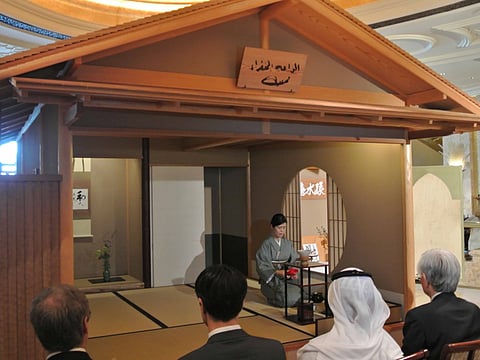Cultural connections
Japanese citizens in the UAE uphold their cultural traditions yet at the same time fully embrace their adopted country

There is a strong bond between Emirati and Japanese residents, for both nationalities appreciate the similar values of good manners, hospitality, respect and craftsmanship.
The Japanese Tea Ceremony, Urasenke chado, is a case in point where traditional cultures blend harmoniously together. Instructor Kinuyo Shibasaki gives tea lessons twice a week to Emirati and Japanese members of the Urasenke Abu Dhabi Study Group.
Urasenke is one of the main schools of the traditional tea ceremony, which is a lot more than just drinking tea. The basic concept is wa kei sei jaku meaning harmony, respect, purity and tranquillity, says Shibasaki, Abu Dhabi resident for 15 years. “Through the chado [tea ceremony] activities with UAE nationals, we Japanese also learn about our own culture more deeply. Sometimes we learn it even from Emirati members.”
Shibasaki often adds a UAE flavour into the tea ceremony, using for example, Arabic calligraphy or sweets instead of traditional Japanese fare. She teaches at two tea rooms in the capital, one at the Japanese School and the other at the Emirates Palace Hotel.
Yotaro Matsutani from Tokyo lived in the UAE for 11 years prior to returning in 2016 to study at Zayed University in Abu Dhabi. Part of a professional drumming group in Tokyo called Wadaiko SAI, he believed a traditional wadaiko (Japanese drums) group would go down well here. In January last year he and Emirati Taryam Al Katheeri formed the Emirati-Japanese Kharsha band.
“We realised that a wadaiko performance had great potential to represent both countries,” he says.Matsutani believes non-verbal communication is an important cultural aspect, something that Japanese people use frequently.
“We call it kuuki wo yomu. We try to preserve it by using it in our performances, since we have to synchronise without a maestro controlling the team.”
Naoko Kishida, Director and founder of the UAE-Japan Cultural Center, celebrates the centre’s 10th anniversary this March. She established it to build mutually beneficial relationships between UAE nationals and Japanese
residents in the UAE.
Last month, January 20, the centre hosted its annual Japanese New Year event at Multaqa, Al Qasba in Sharjah. Activities included a karate master performance and competitions in traditional kakizome (calligraphy), furoshiki (cloth wrapping), origami (paper crafting) and Othello board games.
Married to a UAE national, Kishida lives in Umm Al Quwain where she incorporates Japanese culture into the family’s lifestyle and children’s education. “But at the same time, I respect my husband’s UAE culture. I try to implement a large part of the UAE and Arabic culture as well.”
Growing up in Dubai, Erika Hayashi maintained her culture for 16 years by taking Japanese lessons at school, karate after-school and currently sustains it through food, whether that’s cooking with her parents or eating Japanese cuisine. She is originally from Tokyo and studying at King’s College London.
“If the Japanese are known for anything it’s definitely politeness, and I feel this is essential in a world where manners aren’t necessarily important nowadays and are starting to lose significance,” she says.
Intertwining fashion cultures is what Takeshi Harikai brings to the mix. He works full time as an architect at ibda Design based in Dubai but as a sideline recently introduced a clothing brand known as Alica, a fusion of Japanese and Middle Eastern clothing. He hopes to incorporate both cultures and propagate traditional Japanese craftsmanship within this line.
One of his garments he has named Avandura, meaning a mix of kandora and avant-garde. In Dubai, Japanese influences are never far away. He found his favourite Japanese pastry (curry bread) at Yamanote Atelier at the Dubai Frame and he promotes his language by teaching it to other employees at their request. “They are delighted with this cultural exchange,” he says.



